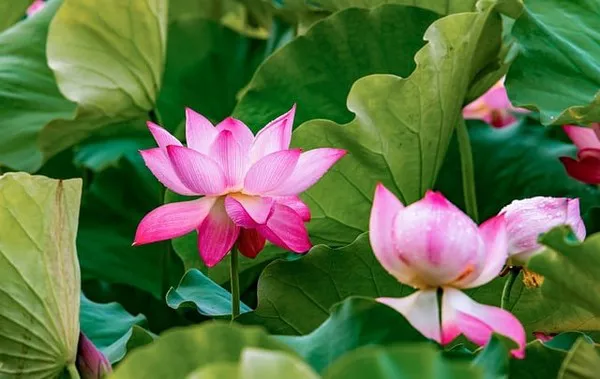In the realm of body art, tattoos have long been celebrated as a means of self-expression and a canvas for personal stories. Among the myriad of designs, the lotus flower tattoo stands out as one of the most captivating and meaningful choices. This article delves into the rich symbolism and cultural significance of the lotus flower tattoo, shedding light on the profound meanings it holds for those who choose to adorn their bodies with this beautiful emblem.
The Lotus Flower: An Ancient Symbol of Enlightenment
The lotus flower has held a prominent place in the cultural and spiritual tapestry of various societies for centuries. It’s an emblem of beauty, resilience, and profound transformation. Originating from the murky waters, the lotus emerges unspoiled, pristine, and radiant. This natural journey serves as an allegory for human experiences and has led to the widespread adoption of the lotus flower as a symbol of enlightenment.
In many Eastern philosophies, particularly within Buddhism and Hinduism, the lotus flower is associated with spiritual awakening and purity. The various stages of the lotus’ growth mirror the spiritual journey of an individual, symbolizing the progress from darkness and ignorance to enlightenment and self-realization.
Lotus Flower Variations and Their Significance
Lotus flowers come in a variety of colors, and each hue carries its own unique meaning. When choosing a lotus flower tattoo, individuals often consider the color to align the tattoo’s significance with their personal beliefs and experiences. Here are some common color variations and their associated meanings:
White Lotus Flower: The white lotus symbolizes purity, spiritual enlightenment, and the perfection of one’s soul. It is often linked to divine wisdom, serenity, and the attainment of inner peace.
Red Lotus Flower: The red lotus is a symbol of love, compassion, and passion. It is associated with the heart, representing deep emotions and the desire to overcome challenges with love and kindness.
Blue Lotus Flower: The blue lotus is linked to wisdom, knowledge, and the quest for truth. It signifies the continuous pursuit of enlightenment and self-improvement.
Pink Lotus Flower: Pink lotus flowers are connected to the Buddha and his teachings. They represent the history and legends of Buddhism, particularly as they relate to devotion, purity, and compassion.
Purple Lotus Flower: The purple lotus is often associated with mysticism, esoteric knowledge, and the connection between the material and spiritual worlds. It signifies a sense of mystery and the pursuit of higher consciousness.
The Placement of the Lotus Flower Tattoo
The choice of where to place a lotus flower tattoo on the body also adds layers of meaning to the design. Different body locations are associated with varying aspects of life and experiences. Here are some common placement options and their symbolism:
Lotus on the Wrist: A lotus tattoo on the wrist is often seen as a symbol of personal growth and spiritual awakening. It serves as a constant reminder of one’s journey toward enlightenment.
Lotus on the Ankle: An ankle tattoo represents flexibility and adaptability. Just as the lotus gracefully moves with the water, those with an ankle lotus tattoo embrace change and transformation.
Lotus on the Back: A lotus tattoo on the upper or lower back can symbolize the blossoming of one’s spiritual self and the emergence of inner strength and resilience.
Lotus on the Chest: A lotus tattoo on the chest is associated with deep emotions, love, and the pursuit of a compassionate heart. It signifies the blossoming of one’s emotional self.
Lotus on the Forearm: A forearm lotus tattoo is a symbol of visibility and personal transformation. It signifies one’s readiness to face challenges and embrace change.
Cultural Significance and Variations
The lotus flower holds diverse cultural significance in various parts of the world. Understanding these cultural variations can help individuals choose a lotus tattoo that resonates with their heritage and personal beliefs.
Hinduism: In Hinduism, the lotus flower is closely tied to deities like Brahma and Vishnu. It represents purity, beauty, and the emergence of divinity from chaos.
Buddhism: In Buddhism, the lotus symbolizes enlightenment and the purity of mind and spirit. The various stages of lotus growth reflect the stages of spiritual development on the path to nirvana.
Egypt: In ancient Egypt, the lotus flower held sacred significance and was associated with rebirth and creation. It was often used in funerary art to symbolize the cycle of life.
Chinese Culture: In Chinese culture, the lotus is a symbol of purity, harmony, and upward growth. It is often associated with Confucian values and represents the pursuit of a virtuous life.
Native American Cultures: Some Native American tribes incorporate lotus symbolism into their traditional beliefs, where it may represent spirituality, enlightenment, and rebirth.
Personal Interpretations and Inspirations
While the cultural and traditional meanings of the lotus flower are essential, many individuals choose this design for deeply personal reasons. Some people may relate the lotus to a particular life experience or moment of transformation. For them, the tattoo serves as a constant reminder of their personal growth and journey towards self-improvement.
Conclusion
The lotus flower tattoo is a captivating and deeply meaningful choice for those seeking to express their personal and spiritual journey through body art. Its rich symbolism and cultural significance make it a compelling choice, allowing individuals to convey their personal beliefs, experiences, and values through the beauty of this sacred flower. Whether one seeks enlightenment, resilience, purity, love, or transformation, the lotus flower tattoo offers a canvas for personal expression, a reminder of one’s inner strength, and a symbol of the beauty that emerges from the murkiest of waters.


